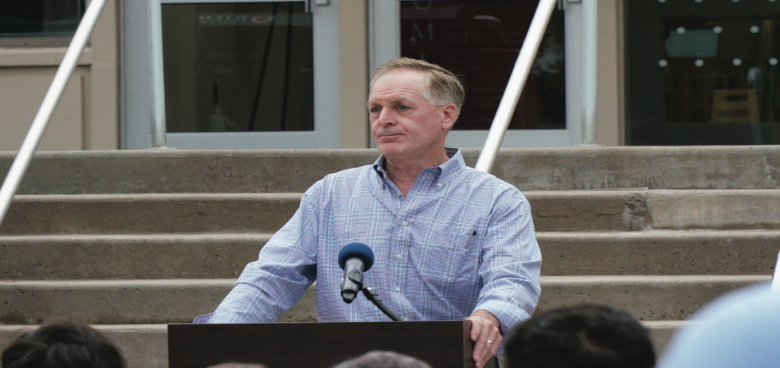
Gov. MarkSchweiker reflectson Sept. 11 attacks
By Tori Pender
The 20th anniversary of Sept. 11, 2001, was memorialized at the front plaza of Moore Library on Sept. 9. The ceremony was hosted by Rider’s Veterans and Military Affairs department with a follow-up Q&A with former Pennsylvania Gov. Mark Schweiker ’83 and Micah Rasmussen of The Rebovich Institute for New Jersey Politics.
President Gregory Dell’ Omo emotionally said, “The memories in the history of Sept. 11 will always belong to the entire nation and indeed the world. Those of us old enough to have lived through that awful moment can never forget the horrific sights and sounds we saw and heard with our own eyes and ears.”
Gov. Schweiker led Pennsylvania’s emergency response and recovery efforts. He saw firsthand the devastating effects caused by the violent crash of United Airlines Flight 93 in Shanksville, Pennsylvania.
“It’s important to me that the visitor sees what those 40 people took on,” Schweiker said. “To stand for freedom, to take that kind of stand that costs their lives.”
Schweiker vividly recalls being at the crash site, which he described as a 70-acre crime scene.
“I have not forgotten Captain Victor Saracini, who was the captain of United Flight 175 that hit the south tower at 9:03:02 a.m. A good Bucks County man with a wonderful spouse by the name of Ellen and two daughters, and my pledge was to tell their story. … For me, it is about keeping the pledge,” said Schweiker.
Reading of the names and bell tolls by Student Government Association officers, junior political science major Andrew Bernstein, and senior psychology major Talyn Trobiano memorialized the eight alumni Rider lost on Sept. 11.
Schweiker said, “We don’t want another mass casualty incident, none of us do. But we have an obligation for those of us who have lived this, to speak the truth, to remind us of what’s at stake.”
Following the Sept. 11 ceremony, a Q&A was hosted by the Rebovich Institute for New Jersey Politics with former Pennsylvania Gov. Mark Schweiker in the Mercer room at Daly’s Dining Hall.
On Sept. 11, 2001 Schweiker, as governor, was also the chairman of the Pennsylvania Emergency Management Council, making him the top executive emergency response. Typically, the FBI handles crisis management, investigation and the state governments have the responsibility to handle consequence management.
Schweiker explained as Flight 93 was being overtaken, the FBI was tracking it over Ohio before it lost communication.
Because of his ability to quickly and adequately respond to events, Schweiker has advised many mayors and governors dealing with tragic situations like the Columbine High School massacre in Littleton, Colorado.
The first student asked question went to graduate student Austin Ferguson who asked, “When specifically looking at current terrorism, security, what changes have you seen from the start of conflict involvement after Sept. 11?”
Schweiker said, “I wish everyone would answer with the integration of the federal agencies and their ability to, quote-unquote, play together. Trade Information. Relative to counterintelligence [and] counterterrorism.”
The sense of bioterrorism in the county level’s capacity Schweiker described as having more sensitivity and acuity, especially with first responders.
Schweiker continued, “You know, you might be able to talk about when you approach a fire, and you’re not sure what’s in there, you’re going to go in carefully. Well, when it comes to now, and PD is called out, they’ll approach it carefully. That mindset didn’t exist before September of 2001. It does now. So I think the interaction between the levels of government and the different response entities is much better and I think sensitivity is very high.”
On the topic of partisan politics, Schweiker explained how plenty of state governments are getting the job done without the political drama.
“But I realize your real question is, you know, given the state of affairs in Washington, D.C., and the seeming inability to even get the cap, the hard infrastructure bill passed, which has never been a partisan,… it was always out there was never going to be without a final doubt going to go do it, that took a long time. So kind of a surprise. So I do believe we have plenty of states where the bipartisan model is alive and working. I do believe we have, you know, the alt-right and the far-left, poison some of the debate,” said Schweiker.


